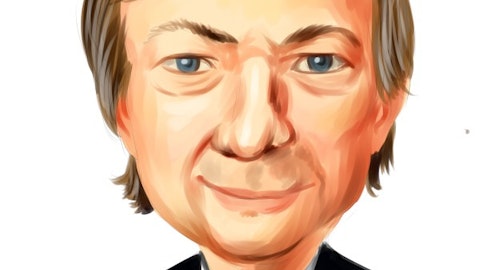Not even the stock picks of legendary investor Warren Buffett of Berkshire Hathaway could deliver positive returns in the third quarter, one which saw the S&P 500 decline by about 6.9%, though they did beat the market based on our calculations. Buffett’s 45 positions in stocks with at least a $1 billion market cap delivered a weighted average returns loss of 5.9% in the third quarter, based on the size of his holdings as of June 30. That dragged Buffett’s stock pick returns down to a loss of 7.8% year-to-date using the same method of calculations.

It’s not as if Buffett himself didn’t see the major market correction coming. He said during a CNBC interview in May that stocks would not look cheap and would be on the high side on a valuation basis should interest rates normalize. While rates have not yet actually increased, the uncertainty over a potential rate hike was certainly one of the factors that led to the heavy selling in mid-August.
Follow Warren Buffett's Berkshire Hathaway
Then there’s the so-called ‘Warren Buffett Indicator’, which Buffett famously described as “probably the best single measure of where valuations stand at any given moment” during a 2001 interview with Fortune Magazine. That valuation method measures the value of a country’s corporate equities against its GDP. Anything over 100% and the equities of that country are considered overvalued. It registered a 153.6% in the U.S just before the tech bubble burst in 2000, and has soared from a low point of just over 62% after the 2008 financial crisis to over 125%.
Professional investors like Buffett spend considerable time and money conducting due diligence on each company they invest in, which makes them the perfect investors to emulate. However, we also know that the returns of hedge funds and other investment firms have not been good on the whole for several years, underperforming the market. We analyzed the historical stock picks of these investors and our research revealed that the small-cap picks of these funds performed far better than their large-cap picks, which is where most of their money is invested and why their performances as a whole have been poor. Why pay fees to invest in both the best and worst ideas of a particular hedge fund when you can simply mimic the best ideas of the best fund managers on your own? A portfolio consisting of the 15 most popular small-cap stock picks among the funds we track has returned 118% and beaten the market by more than 60 percentage points since the end of August 2012 (see the details).
Regardless of where the market heads, Buffett is a long-term investor and has supreme faith that his top picks will outperform the market and deliver strong returns over the long-term; and who can argue with him? Let’s check out the performance of some of Buffett’s top stock picks and where they might head from here.
Wells Fargo & Co (NYSE:WFC)
- Shares Owned by Buffett (as of June 30): 470,292,359
- Value of Buffett’s Shares (as of June 30): $26.45 Billion
- Percentage of Buffett’s Public Equity Portfolio (as of June 30): 24.67%
- Third Quarter Returns: -8.10%
Buffett’s top pick was also the second-worst performing stock among his top five picks, unhelped by the fact that interest rates weren’t raised, which was a short-term blow to financial stocks. The most valuable bank in the world, with a market cap of $263.60 billion, Wells Fargo & Co (NYSE:WFC) recently announced the acquisition of General Electric Company (NYSE:GE)’s railcar services and leasing businesses, which will make it the second-largest lessor of railcars and locomotives in North America. Billionaire Ken Fisher has the largest position in Wells Fargo & Co (NYSE:WFC) in our database after Berkshire’s, owning 18.70 million shares.
Follow Wells Fargo & Company (NYSE:WFC)
Follow Wells Fargo & Company (NYSE:WFC)
Receive real-time insider trading and news alerts
The Coca-Cola Co (NYSE:KO)
- Shares Owned by Buffett (as of June 30): 400,000,000
- Value of Buffett’s Shares (as of June 30): $15.69 Billion
- Percentage of Buffett’s Public Equity Portfolio (as of June 30): 14.64%
- Third Quarter Returns: -3.15%
The Coca-Cola Co (NYSE:KO) was the top performing stock among Buffett’s top five stock picks, rebounding by more than 5% from its August low point. The second-most popular fast moving consumer goods stock among the investors we track, Coca-Cola is one of just a handful of ‘dividend kings’, and was recently honored as one of the Brands of the Year at the World Branding Awards, for the second straight year. Deutsche Bank recently initiated coverage of Coca-Cola with a ‘Buy’ rating and a $45 price target on the stock, representing upside potential of more than 10%. Another prominent value investor, Donald Yacktman’s Yacktman Asset Management, is also betting big on The Coca-Cola Co (NYSE:KO), with a position of over 30.49 million shares.
Follow Coca Cola Co (NYSE:KO)
Follow Coca Cola Co (NYSE:KO)
Receive real-time insider trading and news alerts
International Business Machines Corp. (NYSE:IBM)
- Shares Owned by Buffett (as of June 30): 79,565,115
- Value of Buffett’s Shares (as of June 30): $12.94 Billion
- Percentage of Buffett’s Public Equity Portfolio (as of June 30): 12.07%
- Third Quarter Returns: -10.14%
International Business Machines Corp. (NYSE:IBM) was the worst performer among Buffett’s top five stock picks, losing over 10% in the third quarter due to the market weakness and the continuing weakness in the PC industry. Undeterred, Buffett used the opportunity to purchase additional shares (an undisclosed amount) of IBM during the third quarter, which he revealed during an early-September interview on CNBC. “We bought it in the first quarter, and normally I wouldn’t tell you this, but we bought some in the third quarter,” Buffett said of IBM during the interview. Prem Watsa, dubbed “The Canadian Warren Buffett”, is thinking along the lines of his fellow colleague when it comes to International Business Machines Corp. (NYSE:IBM), owning 1.36 million shares, which also ranks it as Watsa’s third-largest U.S public equity position.
Follow International Business Machines Corp (NYSE:IBM)
Follow International Business Machines Corp (NYSE:IBM)
Receive real-time insider trading and news alerts
American Express Company (NYSE:AXP)
- Shares Owned by Buffett (as of June 30): 151,610,700
- Value of Buffett’s Shares (as of June 30): $11.78 Billion
- Percentage of Buffett’s Public Equity Portfolio (as of June 30): 10.99%
- Third Quarter Returns: -4.62%
American Express Company (NYSE:AXP)’s third quarter returns weren’t terrible (in a relative sense), likely due to the fact that it had already sank quite a bit this year. It’s been a year to forget for American Express stockholders, as shares have fallen by just over 20% year-to-date. The bulk of those losses came in January, when it was revealed that American Express was at risk of losing Costco Wholesale Corporation (NASDAQ:COST) as a customer, which it eventually did. American Express has partially filled the void since, partnering up with Sam’s Club, though the expected revenue from that deal is a fraction of what it was pulling in through its exclusive partnership with Costco (which it won’t have with Sam’s Club). It’s likely for those reasons that hedge fund interest in American Express declined during the second quarter among those we track, falling by eight investors to 65 with long positions, though the value of their collective holdings was up slightly. Part of the reason for that was the large new position in the stock opened by ValueAct Capital’s Jeffrey Ubben, of 11.1 million shares valued at over $862 million.
Follow American Express Co (NYSE:AXP)
Follow American Express Co (NYSE:AXP)
Receive real-time insider trading and news alerts
Wal-Mart Stores, Inc. (NYSE:WMT)
- Shares Owned by Buffett (as of June 30): 60,385,293
- Value of Buffett’s Shares (as of June 30): $4.28 Billion
- Percentage of Buffett’s Public Equity Portfolio (as of June 30): 3.99%
- Third Quarter Returns: -7.96%
Lastly is Wal-Mart Stores, Inc. (NYSE:WMT), which was also suffering through a poor year even before the market declines in August. Shares have trended down all year as Wal-Mart’s growth suffers and its push to enhance online sales fails to progress at the desired pace. Then there was the much-publicized raising of the pay floor for Wal-Mart employees to $9 per hour from $7.25 per hour, which has had a notable effect on the company’s bottom-line. Wal-Mart’s fiscal second quarter of 2016 income slid by 8.2% year-over-year, forcing it to lower its full-year income forecast. That in turn has led the company to pressure suppliers to lower costs, and to reportedly cut back on worker hours as it tries to make up the $1 billion in added costs. In our own stock analysis earlier this year of Wal-Mart and rival Target Corporation (NYSE:TGT), we declared Target the winner based on its sharper focus and stronger growth. The Bill & Melinda Gates Foundation Trust, managed by Michael Larson, holds 11.60 million shares of Wal-Mart Stores, Inc. (NYSE:WMT).
Follow Walmart Inc. (NYSE:WMT)
Follow Walmart Inc. (NYSE:WMT)
Receive real-time insider trading and news alerts
Disclosure: None




